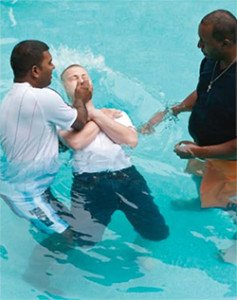
How do you “get saved” as a Catholic? This is something I’ve had on the burner for a long time, and have started writing more than once before. Now my dearest reader asks the question and I’m motivated to come up with a concise response.
“Getting saved,” in the parlance of Evangelical Protestants, refers to the experience of salvation by faith, being regenerated and justified by God’s grace, receiving the Holy Spirit, and becoming a Christian. It’s not a term that Catholics generally talk about: In the Catholic understanding, as I’ve discussed before, salvation is not a singular, one-time event, but a journey and a process, an ongoing series of events and encounters with God’s grace, especially through the Sacraments.
The reader will know from my blog how one already a Christian becomes a Catholic; but how does one who has no relationship with God at all, the unchurched sinner, become a Christian in the Catholic Church? Does one pray a “sinner’s prayer”? I was taken aback by the question; I’d never really thought about it. The “sinner’s prayer,” in the Evangelical tradition, is a simple acknowledgement to God that one is a sinner in need of His grace and salvation, repenting of those sins and asking Him to come into one’s life and heart. In the traditions my reader and I grew up in, “praying the sinner’s prayer” is shorthand for salvation, after which one is “saved”; and while many even in those traditions would admit that God continues to work in our lives through sanctification, that is generally understood to be “it,” all there is to “getting saved.” (Interestingly, even in the Southern Baptist Convention there has been a recent turn away from this attitude.)

The Baptism of Cornelius (1709), by Francesco Trevisani (Wikipedia).
Generally speaking, no, Catholics do not believe that praying a “sinner’s prayer,” by itself, will “get one saved.” So if, in the Catholic understanding, salvation is a journey, how does one take her first steps? Sacramentally speaking, Baptism is the entrance into the Christian life of grace and into the Church, one’s initial justification and when one can rightly say to be “getting saved.” But generally, one must go through months of classes as a catechumen in RCIA before one can even be baptized — which seems to the Evangelical mind to be the very antithesis of evangelism and outreach, making it positively difficult, apparently, for sinners to come into the kingdom.
(The critic would raise, and he would be right, that the earliest Christians in Acts 2 didn’t have to endure through months of a catechumenate before they could receive Baptism. But St. Justin Martyr attests that by the mid–second century, some period of preparation and instruction in Christian doctrine was required. There are exceptions: Any priest can expedite the process of initiation if there is a good reason to, e.g. the catechumen demonstrates a thorough understanding of what she’s getting herself into; and in fact anyone, even a layperson, can baptize in cases of dire need, e.g. the sinner is in danger of death. Since the earliest times, the Church has understood that for the catechumen awaiting Baptism who dies in that desire, God works that saving grace anyway.)
What is the sinner supposed to do, then, who longs to know God and partake of His grace, but is told she has to wait and first be instructed? The Evangelical mode, at least, serves that immediate moment and desire — though there is then the danger of considering salvation “over and done.” And certainly there is that desire, and it can start with a moment, and in that moment and even before, God’s grace is working in the sinner’s life, calling her to repentance and faith.
I think one reason Evangelical Protestants so easily misunderstand the Catholic view of salvation, calling it salvation by works in contrast to salvation by faith, is because faith is immediate and cannot be put off. Saying that salvation begins with Baptism seems to dismiss the role of faith and place emphasis on what seems to be a work. But just as the Catholic understanding of salvation is that of a journey, the preparation for that journey is itself a journey, the journey to the baptismal font: and in those initial steps God’s grace is already working, cultivating the sinner’s faith. Marriage begins with a wedding: a pledge of faith, commitment, covenant, and espousal; but generally one does not choose to be married unless one already has faith in one’s betrothed: one’s relationship with the Bridegroom has already been building for some time. Catholics take a long and patient view of salvation; and we should: we’ve been ushering sinners down that road for 2,000 years!
I would say, now that I’ve thought about it, that something like a “sinner’s prayer” is a good first step, even for embarking on the Catholic road: not that the formulaic words themselves are efficacious or “get one saved,” but that the confession that one is a sinner and wants to make Jesus Christ Lord of one’s life is an appropriate response to what is surely the grace of God already working in one’s life and bringing one to repentance and faith. Pray a “sinner’s prayer”; better yet, make that confession out loud to God and to others. Begin reading the Bible and the Catechism and attending Mass. Talk to a priest and enroll in RCIA. Through all this, God is working in your life, building you in faith, drawing you nearer to Him; and when it does come time for you to receive the graces of Baptism and the Sacraments, you will be saved by faith.


